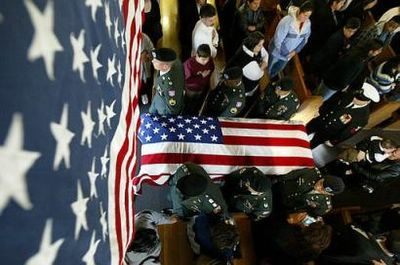United States numb to Iraq troop deaths: experts
 By Michelle Nichols
By Michelle NicholsNEW YORK (Reuters) - In a small box titled "Names of the Dead" on page 10, The New York Times recorded the passing of Cpt. Mark Paine this week, who died after a roadside bomb exploded near his vehicle in Iraq.
His local California newspaper, the Contra Costa Times, ran more than 700 words on Paine's death, including interviews with his mother, father and even his old Scoutmaster, while the San Francisco Chronicle ran a 500-word obituary.
This local coverage of U.S. military deaths "actually has a bigger affect on public opinion than the overall trends," said Matt Baum, an associate professor of politics at University of California, Los Angeles.
"In Iraq, certainly while we were losing relatively small numbers of soldiers early on, I think that was a huge shock," said Max Boot, a senior fellow of national security studies at the New York-based Council on Foreign Relations.
"But now that it's kind of accumulated it doesn't have as much of a shock value. This is reminiscent of (Soviet dictator Joseph) Stalin's phrase about how 'one death is a tragedy, a million deaths is a statistic.' There's some truth to that."
LinkHere




0 Comments:
Post a Comment
<< Home